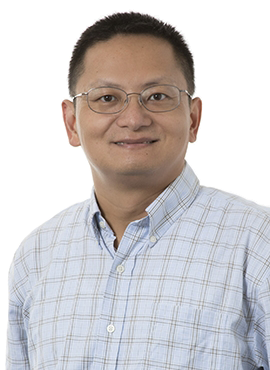Interview | 4 Questions with the IDEaS Leadership Team
Dec 13, 2022 — Atlanta, GA

Transdisciplinary Research Institute for Advancing Data Science Logo
4 Questions with the IDEaS Leadership Team | Featuring Xiaoming Huo; A. Russell Chandler III Professor, H. Milton Stewart School of Industrial and Systems Engineering
This week we introduce Xiaoming Huo, A. Russell Chandler III Professor in the H. Milton Stewart School of Industrial and Systems Engineering at Georgia Tech and Associate Director for Research in the Institute for Data Science and Engineering.
Dr. Huo's research interests include statistical theory, statistical computing, and issues related to data analytics. He has made numerous contributions on topics such as sparse representation, wavelets, and statistical problems in detectability.
1. What is your field of expertise and what questions, or challenges sparked your current research?
My research is focused on the foundational principles of data sciences (also known as machine learning, artificial intelligence, etc.). A large spectrum of algorithms has been developed in the data science field, however, there remains a challenge to understand the performance and limitations of these algorithms and then provide helpful, practical guidelines for their usage by researchers. I began my journey to data science as an undergraduate mathematics major. I have been motivated by the emergence of data sciences and the fact that many of these challenging foundational problems are naturally mathematical. What I am doing now seems to be a perfect spot for someone who wants to explore fundamental mathematics while still making an impact in deployable applications.
2. Why is the field of Data Science and Engineering important to the development of Georgia Tech’s broader research strategy?
In the most recent science and engineering research endeavors, no matter the discipline, large amounts of data are generated and collected. Consequently, more and more research finding across colleges and schools at Georgia Tech, and globally, are data-driven. The ability to correlate and make meaningful connections within data will be essential for future researchers. Additionally, the innovative breakthroughs in science and engineering of the future are likely to rely heavily on the utilization of tools from data science and the availability of new data types.
3. What are the global and social benefits of the research you and your team conduct?
Currently, my research is primarily mathematical. Our end goal is to provide data handling principles, guidelines, and best practices that researchers and students can apply.
4. What are your plans on engaging a wider GT faculty pool with IDEaS research?
I am the executive director of the Transdisciplinary Research Institute for Advancing Data Science (TRIAD) (triad.gatech.edu). In 2017, we won an NSF TRIPODS Phase 1 award to establish this Center. TRIAD is housed under the Institute of Data Engineering and Sciences (IDEaS). I am currently serving as the Associate Director for Research (ADR) of IDEaS. As an ADR, I organize campus-wide activities related to data science research at Georgia Tech, aiming to catalyze collaborative activities. My current project is to organize a Georgia Tech workshop on the foundations of data science. We hope to provide a brainstorming event for relevant researchers in early 2023.
Learn More About the Team’s Work Here: https://sites.gatech.edu/xiaoming-huo/

Xiaoming Huo; A. Russell Chandler III Professor, H. Milton Stewart School of Industrial and Systems Engineering




